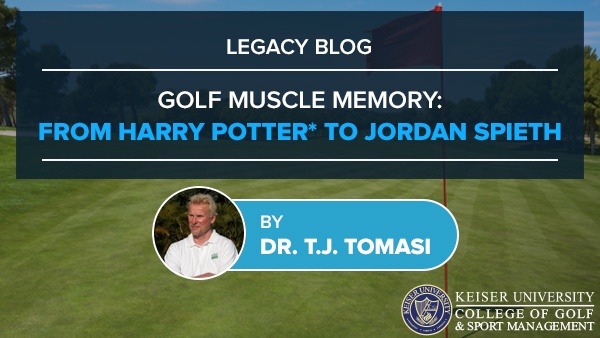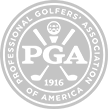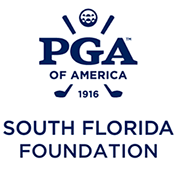Golf Muscle Memory: From Harry Potter* to Jordan Spieth

A Legacy Post by Keiser University College of Golf Senior Faculty and Director of Research Dr. T. J. Tomasi (1940-2023)
A Pensieve is a magical instrument used by Professor Dumbledore* to manipulate memories. Is this merely the product of a childlike imagination that exists only in a Harry Potter* work of fiction? Not anymore!
Research from the University of Southern California takes us another step closer to ultimately possessing an expert golf experience – or any other set of memories/skills we might desire.
Golf Research
Here’s what science says: The hippocampus is a brain area where important short-term memories held for 15-30 seconds can be converted to long term skills lasting years by a complicated electrical signal process tied to repetition. Head researcher Ted Berger has located two areas, CA3 and CA1, that are linked together by a code when an electrical message travels between them, thereby turning short term memory into permanently remembered experiences like motor skills. Working with test animals, Berger figured out the code then installed a device that strengthened the memories being generated by the brain, thus enhancing memory traces into long-term memory without the encumbrance of practice. In addition to enhanced memory, experiments with humans are now underway to implant packaged memories with the promise that you will be able to have ‘been there done that’ without having been there or having done that. This was the main theme of the 1990 movie Total Recall starring Arnold Schwarzenegger as a man who takes a “virtual vacation” to the planet Mars via the implant of dedicated brain environments.
Futurist Ray Kurzweil, in his book The Singularity is Near, predicts that by 2040 there will be brain scans that upload both mental and physical histories into a computer and thus become available for download to the brain of anyone who wants to change their reality. As Kurzweil describes it, “This process would capture a person’s entire personality, memory, skills and history.” And it would be entirely your choice. You could be Winston Churchill, Iggy Pop, or even Hillary Clinton before she had the Rodham removed – or you could opt for the ‘schizoid model’ and become all three at once. If you’re a golfer, you might choose the Jordan Spieth model with short game by Cory Pavin, circa 1996. No wonder space aliens have those big heads – they’re all prefab thinking and no practical doing – much like our current politicians.
Of course, with all those ‘memories’ there would be no need for golf teachers, equipment or even actual golf itself. Maybe, somewhere in the future, humans can permanently shelter in place, passing the time by binge loading endless streams of happy experiences – including, of course, great golf.
Memory in Golf
Memory in golf is not just about remembering specific shots or outcomes but also about retaining and applying lessons learned from past experiences. Effective memory management can help golfers adapt to changing conditions, anticipate challenges, and make informed decisions throughout their round. By honing their memory skills through practice and mental training, golfers can enhance their overall performance and achieve greater success on the course.
Motor Learning in Golf
Motor learning in golf refers to the process by which golfers acquire and refine the physical skills necessary for executing golf shots effectively. It involves the development of muscle memory and coordination through repeated practice and feedback. Motor learning encompasses various aspects of the golf swing, including grip, stance, posture, backswing, downswing, and follow-through. Golfers engage in deliberate practice and receive instruction from coaches to optimize their motor learning process, ultimately aiming to achieve consistency, accuracy, and efficiency in their golf shots. As golfers continue to refine their motor skills over time, they become better equipped to adapt to different course conditions and improve their overall performance on the course.
Golf Muscle Memory
Golf muscle memory refers to the ability of the body to perform golf-specific movements automatically and accurately through repeated practice. It involves the development of neuromuscular pathways that allow golfers to execute consistent and efficient swings without conscious thought. Some skeptics argue that there is no such thing as muscle memory in the literal sense, suggesting instead that muscle adaptation and neural pathways play a more significant role in movement retention. However, regardless of the terminology used, the concept of muscle memory in golf is closely related to motor learning. As golfers practice their swings repeatedly, they reinforce the neural connections between the brain and muscles, improving coordination, timing, and technique. This enhanced motor learning facilitates more consistent and reliable performance on the golf course, as golfers can rely on their ingrained movement patterns to execute shots effectively under pressure. Ultimately, while the exact mechanisms behind muscle memory may be debated, its practical implications for golfers are undeniable, contributing to improved performance and skill acquisition over time.
*Harry Potter and Professor Dumbledore are fictional characters created by author J. K. Rowling’s Harry Potter series.
Learn more!
Want more tips? If you want to take your game to the next level, contact our team at Keiser University’s College of Golf & Sport Management today. With our dedication and experience, we can elevate your game to new heights together. Give us a call today at 888-355-4465.














